
In Kenya, small businesses still cling to plastic bags despite ban

Hundreds of small businesses and independent traders in Kenya continue to use plastic bags for packaging their products despite a ban put in place last September.
Most of the traders still using plastic tend to be those that sell vegetables, clothes, cooked food and milk.
Their usage of the bags has given life to illegal production and sale of the products that are viewed as dangerous to the environment.
While traders are aware of the ban and the penalties, many say they have no other option but to use plastic bags to pack products.
“I cannot pack my vegetables in manilla bags. It cannot work because I wash the vegetables,” Grace Mutuku, a grocery store operator in Komarock on the east of Nairobi said on Wednesday.
“A small bag of sliced vegetables goes for 20 cents. This is what customers are used to. I tried to use the khaki bags but it did not work because of the water in the vegetables.”
As many other traders in the capital, she buys the plastic bags from shops in River Road in downtown Nairobi or from Gikomba market.
“The traders sell but not openly. They have to know you to sell lest they are arrested,” Mutuku said.
Food seller Moses Mugendi said he has stuck with plastic bags because customers are not willing to pay for plastic tins. He sells a cup of githeri (maize and beans mixture) at 25 cents and packs it in plastic bags for free.
“If I am to sell it in a container, I will charge 45 cents, a price customers are not willing to pay,” he said.
Sarah Ajwang, a businesswoman in Busia, a town on the border of Kenya and Uganda, who sells children clothes also said Wednesday that she lacks alternative packaging to plastic bags.
“I move from town selling my clothes in different open air markets. These markets are dusty and the only way to protect the clothes from getting dirty is to pack them in the bags,” she said.
She added that the khaki bags cannot work with her because she needs to display the products for customers to see before they buy.
“I buy the clear bags from Uganda where they are not banned. A pack of 200 pieces goes for $1.40 she said.
The National Environment Authority (NEMA) has intensified crackdown on those using the plastic bags, with inspectors raiding several places to ensure the public complies. Last week, NEMA ordered the closure of Burma market in Nairobi over what it called “high level of violation of the plastic ban”.
The agency also arrested 31 traders in Mombasa for being in possession of plastic bags, and were taken to court, each fined $500 for the offense after pleading guilty.
With the use of the plastic bans ongoing, total transition to alternative packaging materials across the East African nation remains a dream, as plastic bags from neighboring countries find their way into the country.
“Total elimination of use of the bags requires more than just a ban. It needs change of attitude and public education on the danger of the bags to environment. If people stop buying vegetables packed in plastic bags, traders will stop using them,” said Ernest Manuyo, a business management lecturer in Nairobi, adding that the small traders need workable solutions to plastic bags.
NEMA recommends using bags made from paper, bamboo straws and clothes. Citizens are also advised to buy unpackaged food.
Kenya used up to 24 million plastic bags monthly, with half ending up in the environment due to poor disposal. That number has declined significantly because of the ban but it still remains high with the continual use of plastic bags.




